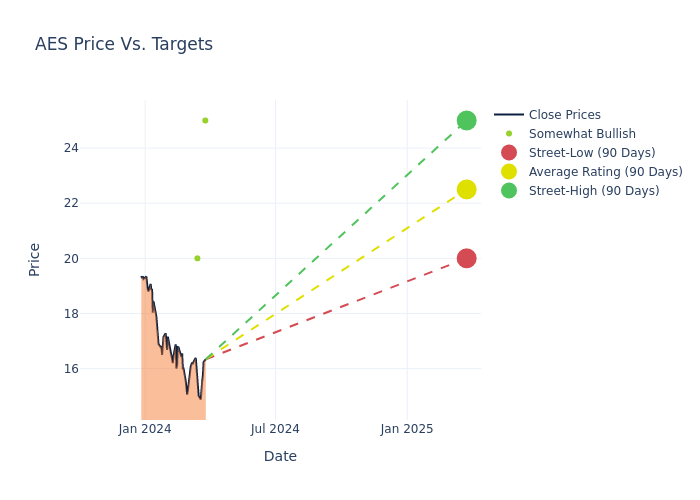4 analysts have shared their evaluations of AES AES during the recent three months, expressing a mix of bullish and bearish perspectives.
Summarizing their recent assessments, the table below illustrates the evolving sentiments in the past 30 days and compares them to the preceding months.
| Bullish | Somewhat Bullish | Indifferent | Somewhat Bearish | Bearish | |
|---|---|---|---|---|---|
| Total Ratings | 0 | 4 | 0 | 0 | 0 |
| Last 30D | 0 | 1 | 0 | 0 | 0 |
| 1M Ago | 0 | 2 | 0 | 0 | 0 |
| 2M Ago | 0 | 0 | 0 | 0 | 0 |
| 3M Ago | 0 | 1 | 0 | 0 | 0 |
Analysts provide deeper insights through their assessments of 12-month price targets, revealing an average target of $22.75, a high estimate of $25.00, and a low estimate of $20.00. Witnessing a positive shift, the current average has risen by 3.41% from the previous average price target of $22.00.

Investigating Analyst Ratings: An Elaborate Study
The analysis of recent analyst actions sheds light on the perception of AES by financial experts. The following summary presents key analysts, their recent evaluations, and adjustments to ratings and price targets.
| Analyst | Analyst Firm | Action Taken | Rating | Current Price Target | Prior Price Target |
|---|---|---|---|---|---|
| Stephen Byrd | Morgan Stanley | Maintains | Overweight | $25.00 | $25.00 |
| Stephen Byrd | Barclays | Lowers | Overweight | $20.00 | $21.00 |
| Stephen Byrd | Morgan Stanley | Raises | Overweight | $25.00 | $24.00 |
| Stephen Byrd | Barclays | Raises | Overweight | $21.00 | $18.00 |
Key Insights:
- Action Taken: In response to dynamic market conditions and company performance, analysts update their recommendations. Whether they 'Maintain', 'Raise', or 'Lower' their stance, it signifies their reaction to recent developments related to AES. This insight gives a snapshot of analysts' perspectives on the current state of the company.
- Rating: Analysts unravel qualitative evaluations for stocks, ranging from 'Outperform' to 'Underperform'. These ratings offer insights into expectations for the relative performance of AES compared to the broader market.
- Price Targets: Understanding forecasts, analysts offer estimates for AES's future value. Examining the current and prior targets provides insight into analysts' changing expectations.
Navigating through these analyst evaluations alongside other financial indicators can contribute to a holistic understanding of AES's market standing. Stay informed and make data-driven decisions with our Ratings Table.
Stay up to date on AES analyst ratings.
Unveiling the Story Behind AES
AES is a global power company. Its current generation portfolio as of year-end 2022 consists of over 32 gigawatts of generation including renewable energy (46%), gas (32%), coal (20%), and oil (2%). AES has majority ownership and operates six electric utilities distributing power to 2.6 million customers.
Unraveling the Financial Story of AES
Market Capitalization: Exceeding industry standards, the company's market capitalization places it above industry average in size relative to peers. This emphasizes its significant scale and robust market position.
Revenue Growth: AES's revenue growth over a period of 3 months has faced challenges. As of 31 December, 2023, the company experienced a revenue decline of approximately -3.01%. This indicates a decrease in the company's top-line earnings. As compared to competitors, the company encountered difficulties, with a growth rate lower than the average among peers in the Utilities sector.
Net Margin: AES's net margin surpasses industry standards, highlighting the company's exceptional financial performance. With an impressive -3.17% net margin, the company effectively manages costs and achieves strong profitability.
Return on Equity (ROE): The company's ROE is a standout performer, exceeding industry averages. With an impressive ROE of -5.24%, the company showcases effective utilization of equity capital.
Return on Assets (ROA): AES's ROA excels beyond industry benchmarks, reaching -0.21%. This signifies efficient management of assets and strong financial health.
Debt Management: AES's debt-to-equity ratio surpasses industry norms, standing at 16.29. This suggests the company carries a substantial amount of debt, posing potential financial challenges.
The Basics of Analyst Ratings
Benzinga tracks 150 analyst firms and reports on their stock expectations. Analysts typically arrive at their conclusions by predicting how much money a company will make in the future, usually the upcoming five years, and how risky or predictable that company's revenue streams are.
Analysts attend company conference calls and meetings, research company financial statements, and communicate with insiders to publish their ratings on stocks. Analysts typically rate each stock once per quarter or whenever the company has a major update.
Analysts may enhance their evaluations by incorporating forecasts for metrics like growth estimates, earnings, and revenue, delivering additional guidance to investors. It is vital to acknowledge that, although experts in stocks and sectors, analysts are human and express their opinions when providing insights.
This article was generated by Benzinga's automated content engine and reviewed by an editor.
© 2025 Benzinga.com. Benzinga does not provide investment advice. All rights reserved.
date | ticker | name | Price Target | Upside/Downside | Recommendation | Firm |
|---|
Trade confidently with insights and alerts from analyst ratings, free reports and breaking news that affects the stocks you care about.